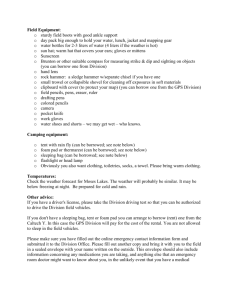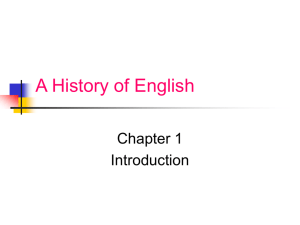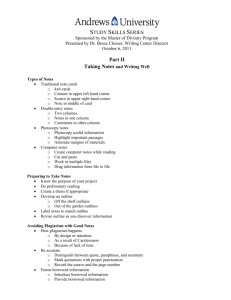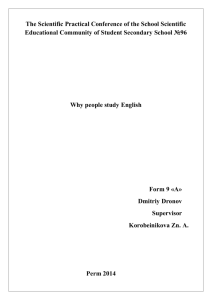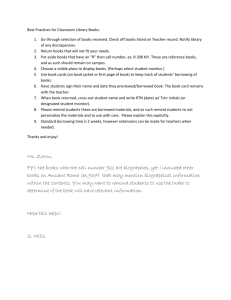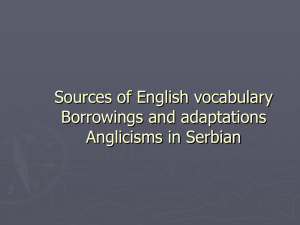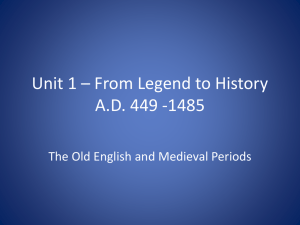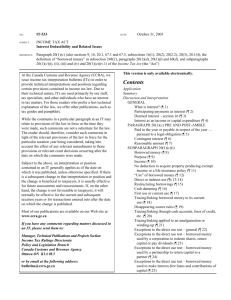Borrowed Words in English
advertisement
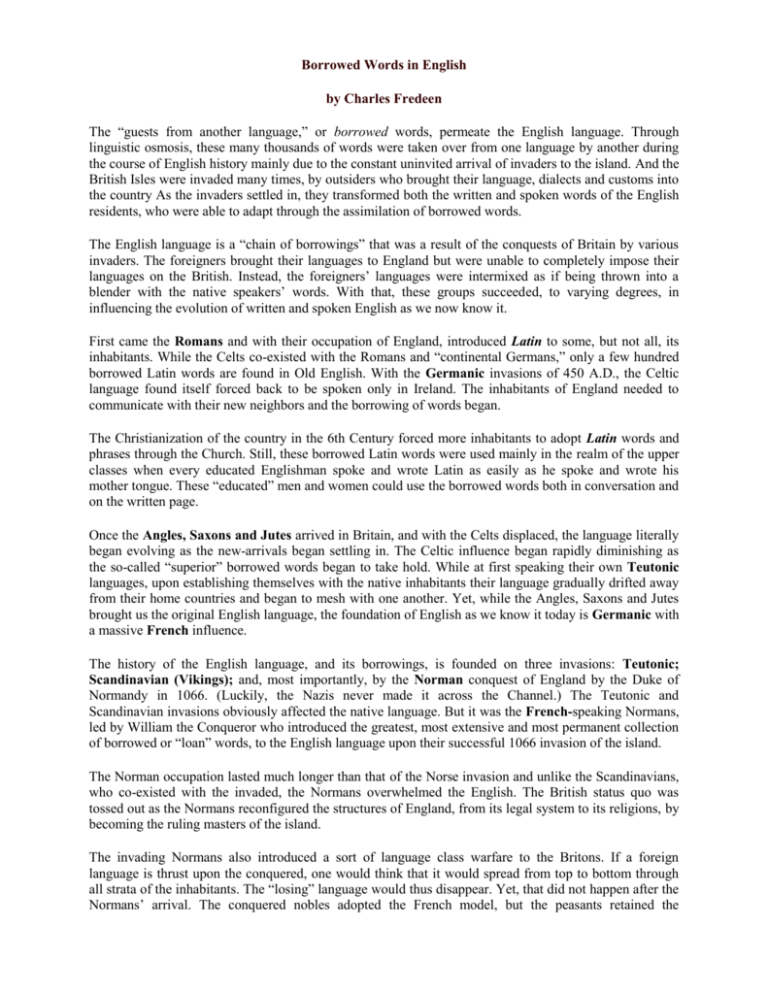
Borrowed Words in English by Charles Fredeen The “guests from another language,” or borrowed words, permeate the English language. Through linguistic osmosis, these many thousands of words were taken over from one language by another during the course of English history mainly due to the constant uninvited arrival of invaders to the island. And the British Isles were invaded many times, by outsiders who brought their language, dialects and customs into the country As the invaders settled in, they transformed both the written and spoken words of the English residents, who were able to adapt through the assimilation of borrowed words. The English language is a “chain of borrowings” that was a result of the conquests of Britain by various invaders. The foreigners brought their languages to England but were unable to completely impose their languages on the British. Instead, the foreigners’ languages were intermixed as if being thrown into a blender with the native speakers’ words. With that, these groups succeeded, to varying degrees, in influencing the evolution of written and spoken English as we now know it. First came the Romans and with their occupation of England, introduced Latin to some, but not all, its inhabitants. While the Celts co-existed with the Romans and “continental Germans,” only a few hundred borrowed Latin words are found in Old English. With the Germanic invasions of 450 A.D., the Celtic language found itself forced back to be spoken only in Ireland. The inhabitants of England needed to communicate with their new neighbors and the borrowing of words began. The Christianization of the country in the 6th Century forced more inhabitants to adopt Latin words and phrases through the Church. Still, these borrowed Latin words were used mainly in the realm of the upper classes when every educated Englishman spoke and wrote Latin as easily as he spoke and wrote his mother tongue. These “educated” men and women could use the borrowed words both in conversation and on the written page. Once the Angles, Saxons and Jutes arrived in Britain, and with the Celts displaced, the language literally began evolving as the new-arrivals began settling in. The Celtic influence began rapidly diminishing as the so-called “superior” borrowed words began to take hold. While at first speaking their own Teutonic languages, upon establishing themselves with the native inhabitants their language gradually drifted away from their home countries and began to mesh with one another. Yet, while the Angles, Saxons and Jutes brought us the original English language, the foundation of English as we know it today is Germanic with a massive French influence. The history of the English language, and its borrowings, is founded on three invasions: Teutonic; Scandinavian (Vikings); and, most importantly, by the Norman conquest of England by the Duke of Normandy in 1066. (Luckily, the Nazis never made it across the Channel.) The Teutonic and Scandinavian invasions obviously affected the native language. But it was the French-speaking Normans, led by William the Conqueror who introduced the greatest, most extensive and most permanent collection of borrowed or “loan” words, to the English language upon their successful 1066 invasion of the island. The Norman occupation lasted much longer than that of the Norse invasion and unlike the Scandinavians, who co-existed with the invaded, the Normans overwhelmed the English. The British status quo was tossed out as the Normans reconfigured the structures of England, from its legal system to its religions, by becoming the ruling masters of the island. The invading Normans also introduced a sort of language class warfare to the Britons. If a foreign language is thrust upon the conquered, one would think that it would spread from top to bottom through all strata of the inhabitants. The “losing” language would thus disappear. Yet, that did not happen after the Normans’ arrival. The conquered nobles adopted the French model, but the peasants retained the Germanic tongue, setting up both a class and a linguistic divide that would remain until their languages, and borrowed words, blended into Middle English. The Norman Conquest forced the creation of an entirely new way of English life, influencing the language of its law, religion, medicine and arts. Since the French/Latin-speakers were the dominant power, the Britons had to borrow words in order to simply communicate with their new masters. The amazing thing about the transformation and evolution of the English language is the extent to how receptive the country’s inhabitants were to outside languages, particularly French and Latin. It is almost as if an invader could plant a language seed and the Britons would cultivate it. But unlike the French who most likely would stay with that one language plant, the English (perhaps because of their love of gardening) seemed intent on growing as many synonymous words as possible England’s emergence as a superpower brought it, in a sense, border expansion because of colonialism. This also introduced its people to sights they had never seen and for which they would need descriptive words. The Britons could only borrow them as there was no native term to express what they encountered. There were no such things as boomerangs or kangaroos in England, so when the Britons came upon them instead of creating entirely new words to define them, the easier alternative was to borrow the Australian words. Elephants, leopards and panthers also were not native to England and, again, these animal names would have to be borrowed for Britons to describe them to one another. Even the tomato, unknown in the country until its introduction from the New World, would have to be named. Borrowing from the Spanish tomate, the British settled on tomato. "Foreign" words now easily roll off the tongues of English-speaking people. We all know what a kindergarten, from the German, means. Most would know what a baguette or croissant, from the French, also mean. And, staying with baked goods, the Yiddish bagel (originally beygl) is certainly well known to many English-speaking people, particularly New Yorkers. In wrapping up, the borrowing of words illustrates that when two languages compete for domination over one another, adaptability and adoptability are key ingredients. The Celts did not understand this and their language was marginalized. The Germanic-speakers faced the same fate when confronted with the Norman Conquest, but many of the higher-educated Britons saw the (Gallic/French) writing on the wall and chose to borrow the necessary words and phrases to communicate in a changed environment. By, out of necessity, opting to borrow from their foreign rulers, the English language evolved into the most extensive and prolific on the planet.
